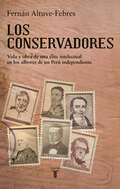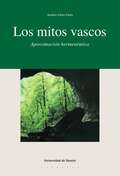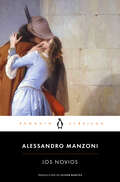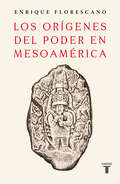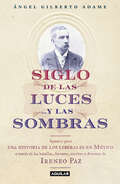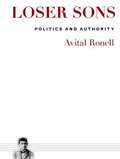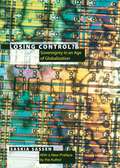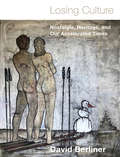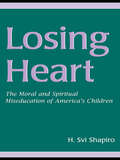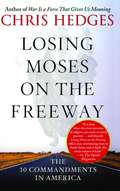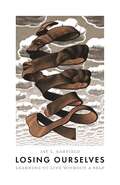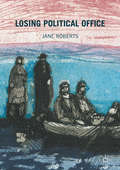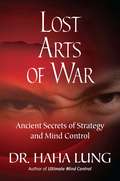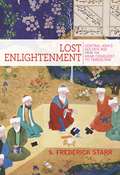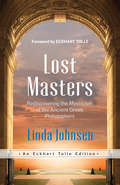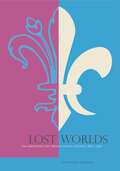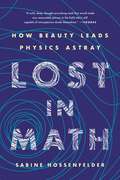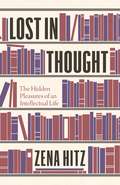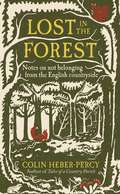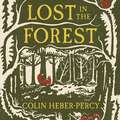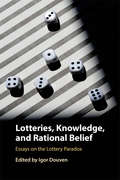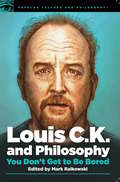- Table View
- List View
Los conservadores: Vida y obra de una élite intelectual en los albores de un Perú inpendiente
by Fernán Altuve-FebresLos conservadores tiene su origen en una inquietante pregunta que atañe a la historia política en el Perú ¿Hemos sido capaces de crear un pensamieno conservador? Hace dos siglos, en los inicios del Perú independiente, más que un pensamiento conservador orgánico, surgieron exponentes intelectuales que sostenían, entre otras ideas, la fidelidad a la monarquía hispánica. Con la Independencia surge el debate entre la alternativa monárquica o republicana como la forma de gobierno más adecuada para el nuevo Estado. ¿Qué beneficios y desafíos conllevaba para el Perú una monarquía moderada o una confederación con Bolivia? ¿De qué modo la élie y la iglesia fortalecieron sus alianzas para preservar el poder? El reconocido abogado y académico Fernán Altuve-Febres da cuenta en este ensayo de algunos de los precursores de esta modalidad del pensamiento nacional. Aplicando el método biográfico-intelectual, y centrándose en el contexto histórico que abarca esde el ocaso del Reino del Perú (1809) hasta la consolidación definitiva de la República (1839), el autor aborda la vida y obra de Blas de Ostolaza, José Ignacio Moreno, José de la Riva-Agüero, José María de Pando, Juan García del Río, Antonio José de Irisarri y José Joaquín de Mora, quienes sientan las bases de la corriente conservadora en el Perú.
Los mitos vascos: aproximación hermenéutica
by Andrés Ortiz-OsésVeinticinco años después de la publicación de su exitosa obra El matriarcalismo vasco, avalada por el propio J.M. Barandiarán, Andrés Ortiz-Osés vuelve a plantear aquí el tema de los mitos vascos desde la distancia que confiere la experiencia. La metodología es la hermenéutica simbólica y la mitología comparada, aportando una interpretación sistemática de la cosmovisión tradicional vasca de forma inteligible y sin forzarla.<P><P> En este libro se dan cita los arquetipos fundamentales (la Tierra madre, la diosa Mari...), así como las leyendas (Kixmi, López de Haro...), el Carnaval y la pelota... La obra se cierra con una consideración sobre el Animismo, el paso de la caverna al templo y al museo (Guggenheim), y la mitología actual.
Los novios
by Alessandro ManzoniLa novela más importante de la literatura italiana moderna en una versión castellana insuperable Prólogo de Francesco Luti Traducción de Esther Benítez Enmarcada en la ocupación española de Lombardía durante el siglo XVII, Los novios cuenta la historia de Lucía y Renzo, dos enamorados de origen campesino que se ven cruelmente separados y que, en sus intentos por reunirse, se enfrentarán a los peligros e iniquidades de una época despiadada. Con temas como el amor, la fe y el poder, la obra perdura no solo como la más importante de Alessandro Manzoni, sino como el primer y mejor ejemplo de la novela italiana moderna. Nuestra edición ofrece un lúcido prólogo de Francesco Luti, profesor de la Universidad Autónoma de Barcelona, y recupera la aclamada traducción de Esther Benítez, que acerca toda la fuerza del original a los lectores hispanohablantes. La crítica ha dicho:«El clásico literario italiano del siglo XIX conocido por sus vívidas descripciones de la peste de 1630 que destruyó Milán». The New York Times «Los novios está entre las mejores novelas que se han escrito. Es perfecta en el interés de la trama, en la documentación histórica, en la frescura de los personajes, en la soltura de los diálogos, en los cambios de ritmo, en los desenlaces, en la habilidad para penetrar los secretos de los corazones».Rafael Gómez Pérez, aceprensa.org «La obra más importante del escritor italiano Alessandro Manzoni. El libro es el primer exponente de la novela italiana moderna y con la Divina comedia de Dante Alighieri es considerada la obra de la literatura italiana más importante y estudiada en las escuelas italianas».Lecturalia
Los orígenes del poder en Mesoamérica
by Enrique FlorescanoUn ensayo sobre los fundamentos del poder político en Mesoamérica y una formidable síntesis histórica del México antiguo La formación del Estado es el proceso civilizador que impulsó el desarrollo de Mesoamérica, el origen de su unidad política y de su identidad social y cultural. Los habitantes de estos territorios construyeron el poder que los organizaría y dotaría de identidad basándose en cuatro pilares: el grupo étnico, el territorio o altépetl, la fundación del reino y la centralización del poder. La particularidad de estas cuatro instituciones no radica, sin embargo, en sus orígenes —ya que las cuatro partieron de procesos sociales y políticos tangibles—, sino más bien en su interiorización en el imaginario colectivo, que tomó forma de mitos, símbolos, imágenes y relatos de matiz religioso e ideológico. En este magnífico ensayo, profusamente ilustrado y actualizado de acuerdo con los descubrimientos más recientes, Enrique Florescano trata desde una perspectiva histórica novedosa la formación del Estado en Mesoamérica, desde su aparición en el Preclásico hasta su abrupto final en las trágicas jornadas de 1521, pasando por los reinos mayas, los poderosos Estados de Teotihuacan, Chichén Itzá y Tula, y los reinos militaristas que dominaron el Posclásico, mostrándonos que la historia política puede situarse en el centro del desarrollo social, económico y cultural de los pueblos que habitaron Mesoamérica.
Los siglos de las luces…y las sombras: Apuntes para una historia de los liberales en México a través de las batallas, fervoeres, escritos y derrotas de Ireneo Paz
by Ángel Gilberto AdameA pesar de sus paradójicas luminarias, la historia de México a veces es cruel con sus caudillos. Los arrincona, los hunde en empresas destinadas al fracaso, los arrumba en el olvido; prueba de ello es la mítica figura de Ireneo Paz, emblema de los liberales mexicanos, militar, poeta, crítico de su tiempo, novelista, editor vehemente y al final de sus días...solo un fantasma. Ángel Gilberto Adame ofrece en esta obra monumental un recuento súbito, espléndidamente documentado de los liberales en México a través de las acciones, disputas, publicaciones y conflictos de Ireneo Paz, quien pleno en sus convicciones / contradicciones expuso sus ideales y su honra al participar militarmente contra la invasión francesa desdeñada por Victor Hugo; cuestionó con viveza los mandatos de Juárez y Lerdo de Tejada; buscó la aprobación y cofradía de Porfirio Díaz, a quien creyó estabilizador de la patria; cedió al hechizo sombrío de Victoriano Huerta y, para él únicamente fue, al final de sus días, el banquete de la desolación.Siglo de las luces... y las sombras sitúa de forma concluyente a Ireneo Paz lo mismo en el campo de batalla que en el duelo donde perdió la vida el hermano de Justo Sierra; en la fundación de periódicos aguerridos que en la redacción del Plan de Tuxtepec que encumbró al porfirismo; en la cárcel y condenado a muerte que en el macabro homenaje al poeta Manuel Acuña.El trabajo de Adame es una indagación lúdica y límpida que, con su habitual deslumbramiento, comparte los vuelcos de la historia de México durante el siglo XIX y principios del XX al trazar el rumbo de un también periodista célebre de su tiempo que defendió sus posturas políticas inmerso en lo temerario, la confrontación y el yerro, al tiempo que encarnó la esenciadel idealista mexicano errabundo en el laberinto de la soledad y la violencia del México convulso de aquellos años y deseos.
Loser Sons: Politics and Authority
by Avital RonellThere are sons who grow up unhappily believing that no matter what they do, they cannot please their fathers. Often unable to shed their sense of lifelong failure, either they give up and suffer in a permanent sulk, or they try with all their might to prove they are worth something after all. These are the "loser sons," a group of historical men as varied as President George W. Bush, Osama bin Laden, and Mohammed Atta. Their names quickly illustrate that not only are their problems serious, but they also make serious problems for others, expanding to whole nations. When God is conceived and inculcated as an angry and impossible-to-please father, the problems can last for generations. In Loser Sons, Avital Ronell draws on current philosophy, literary history, and political events to confront the grim fact that divested boys become terrifying men. This would be old news if the problem didn't recur so often with such disastrous consequences. Looking beyond our current moment, she interrogates the problems of authority, paternal fantasy, and childhood as they have been explored and exemplified by Franz Kafka, Goethe's Faust, Benjamin Franklin, Jean-François Lyotard, Hannah Arendt, Alexandre Kojève, and Immanuel Kant. Brilliantly weaving these threads into a polyvocal discourse, Ronell shows how, with their arrays of powerful symbols, ideologies of all sorts perpetuate the theme that while childhood represents innocence, adulthood entails responsible cruelty. The need for suffering--preferably somebody else's--has become a widespread assumption, not only justifying abuses of authority, but justifying authority itself. Shockingly honest, Loser Sons recognizes that focusing on the spectacular catastrophes of modernity might make writer and reader feel they're engaged in something important, while in fact what they are engaged in is still only spectacle. To understand the implications of her insights, Ronell addresses them directly to her readers, challenging them to think through their own notions of authority and their responses to it.
Losing Control? Sovereignty in the Age of Globalization
by Saskia SassenExamining the rise of private transnational legal codes and supranational institutions such as the World Trade Organization and universal human rights covenants, Saskia Sassen argues that sovereignty remains an important feature of the international system, but that it is no longer confined to the nation-state.
Losing Control?: Sovereignty in the Age of Globalization (Leonard Hastings Schoff Lectures)
by Saskia SassenWhat determines the flow of labor and capital in this new global information economy? Who has the capacity to coordinate this new system, to create some measure of order? What happens to territoriality and sovereignty, two fundamental principles of the modern state? And who gains rights and who loses rights? Losing Control? examines the rise of private transnational legal codes and supranational institutions, such as the World Trade Organization and universal human rights covenants, and shows that though sovereignty remains an important feature of the international system, it is no longer confined to the nation-state. Other actors gain rights and a kind of sovereignty by setting some of the rules that used to be within the exclusive domain of states. Saskia Sassen tracks the emergence and the making of the transformations that mark our world today, among which is the partial denationalizing of national territory. Two arenas in particular stand out in the new spatial and economic order by their capacity to set their own rules: the global capital market and the series of codes and institutions that have mushroomed into an international human rights regime. As Sassen shows, these two quasi-legal realms now have the power and legitimacy to demand action and accountability from national governments, with the ironic twist that both depend upon the state to enforce their goals. From the economic policy shifts forced by the Mexico debt crisis to the recurring battles over immigration and refugees around the world, Losing Control? incisively analyzes the events that have radically altered the landscape of governance in an era of increasing globalization.
Losing Culture: Nostalgia, Heritage, and Our Accelerated Times
by David BerlinerWe’re losing our culture… our heritage… our traditions… everything is being swept away. Such sentiments get echoed around the world, from aging Trump supporters in West Virginia to young villagers in West Africa. But what is triggering this sense of cultural loss, and to what ends does this rhetoric get deployed? To answer these questions, anthropologist David Berliner travels around the world, from Guinea-Conakry, where globalization affects the traditional patriarchal structure of cultural transmission, to Laos, where foreign UNESCO experts have become self-appointed saviors of the nation’s cultural heritage. He also embarks on a voyage of critical self-exploration, reflecting on how anthropologists handle their own sense of cultural alienation while becoming deeply embedded in other cultures. This leads into a larger examination of how and why we experience exonostalgia, a longing for vanished cultural heydays we never directly experienced. Losing Culture provides a nuanced analysis of these phenomena, addressing why intergenerational cultural transmission is vital to humans, yet also considering how efforts to preserve disappearing cultures are sometimes misguided or even reactionary. Blending anthropological theory with vivid case studies, this book teaches us how to appreciate the multitudes of different ways we might understand loss, memory, transmission, and heritage.
Losing Heart: The Moral and Spiritual Miseducation of America's Children
by H. Svi ShapiroIn this book Svi Shapiro explores the ideological and attitudinal functions of schools, looking especially at what is called the 'hidden curriculum.' He offers both an analysis of the role of education in producing and maintaining attitudes and values that contribute to our competitive, socially unequal, instrumental, consumerist, and self-oriented culture and a radically different vision for what our schools should be about--a vision that focuses on education's role in supporting a more critically reflective, socially responsible, and compassionate culture.Federal and state legislation have propelled schools today in the direction of an increasingly test-driven, instrumental, and individually competitive regime. Under these legislative mandates, schools are increasingly alienating and stressful places for both students and teachers. Most disturbing is that this form of education is not conducive to providing young people with the capacity to cope with the moral, cultural, spiritual, and political challenges of the world they inhabit. More than only offering a critique of schools, Shapiro proposes a counter-vision that can lead to a different kind of culture and society, and he discusses strategies for advocating and implementing it. Written in a style that is very accessible to a wide range of readers, Losing Heart: The Moral and Spiritual Miseducation of America's Children is also carefully researched and draws on relevant theory to make a strong case.This book speaks to a wide range of readers, including academics and students in education, sociology, anthropology, political science, and cultural studies; public school professionals; and the general public interested in education. It will appeal to faculty in schools of education who are looking for a text that offers both a critical language and one that speaks to possibility and change.
Losing Moses on the Freeway: The 10 Commandments in America
by Chris HedgesThe 10 Commandments -- the laws given to Moses by God -- are beyond the scope of human law. They are rules meant to hold us together but, when dishonored, they lead to discord and violence. <P><P> In this fierce, articulate narrative, Hedges, who graduated from seminary at Harvard Divinity School, looks through the lens of each commandment to examine the moral ruin of American society. With urgency and passion, he challenges readers to take a hard look at the disconnect between their supposed values and the shallow, self-absorbed lives many people actually lead. <P> Taking examples from his personal life and twenty years of reporting, Hedges explores one commandment at a time, each through a particular social group. With each story, he reveals the universal nature of personal suffering, discovery, and redemption -- and explores the laws that we have tried to follow, often unsuccessfully, for the past 6,000 years.
Losing Ourselves: Learning to Live without a Self
by Jay L. GarfieldWhy you don’t have a self—and why that’s a good thingIn Losing Ourselves, Jay Garfield, a leading expert on Buddhist philosophy, offers a brief and radically clear account of an idea that at first might seem frightening but that promises to liberate us and improve our lives, our relationships, and the world. Drawing on Indian and East Asian Buddhism, Daoism, Western philosophy, and cognitive neuroscience, Garfield shows why it is perfectly natural to think you have a self—and why it actually makes no sense at all and is even dangerous. Most importantly, he explains why shedding the illusion that you have a self can make you a better person.Examining a wide range of arguments for and against the existence of the self, Losing Ourselves makes the case that there are not only good philosophical and scientific reasons to deny the reality of the self, but that we can lead healthier social and moral lives if we understand that we are selfless persons. The book describes why the Buddhist idea of no-self is so powerful and why it has immense practical benefits, helping us to abandon egoism, act more morally and ethically, be more spontaneous, perform more expertly, and navigate ordinary life more skillfully. Getting over the self-illusion also means escaping the isolation of self-identity and becoming a person who participates with others in the shared enterprise of life.The result is a transformative book about why we have nothing to lose—and everything to gain—by losing our selves.
Losing Political Office
by Jane RobertsBased on in-depth interviews conducted with British politicians, this book analyses the different impacts of leaving political office. Representative democracy depends on politicians exiting office, and yet while there is considerable interest in who stands for and gains office, there is curiously little discussed about this process. Jane Roberts seeks to address this gap by asking: What is the experience like? What happens to politicians as they make the transition from office? What is the impact on their partners and family? Does it matter to anyone other than those immediately affected? Are there any wider implications for our democratic system? This book will appeal to academics in the fields of leadership, political science, public management and administration and psychology. It will also be of interest to elected politicians in central, devolved and local government (current and former), policy makers and political commentators, and more widely, the interested general reader.
Lost Art of War: Ancient Secrets of Strategy and Mind Control
by Lung Dr HahaSun Tzu's The Art of War is an acknowledged masterpiece--for the general reader. Yet the deeper truths of strategy and mind manipulation have been, until now, known only to true scholars dedicated to deciphering illegible scrolls and mastering the nuances of lost languages. Now, Dr. Haha Lung has at last gathered and fully translated these teachings from the shadows of history--the truly dangerous wisdom of the lesser-known masters--and presents them here for those daring, perhaps unwisely, to attain a higher level of dominance. You'll discover: The 12 Cuts: Voritomo's Art of War The War Scroll of Spartacus Musashi's 6 Ways to be VictoriousThe 99 Truths: Hannibal's Black Art of War And much moreBE ADVISED: For academic study ONLY; publisher assumes NO responsibility for content use/misuse. Dr. Haha Lung is the author of more than a dozen books on martial arts, including Ultimate Mind Control, Mind Penetration, Mind Fist, The Nine Halls of Death, Assassin!, Mind Manipulation, Knights of Darkness, and Mind Control: The Ancient Art of Psychological Warfare.
Lost Enlightenment: Central Asia's Golden Age from the Arab Conquest to Tamerlane
by S. Frederick StarrIn this sweeping and richly illustrated history, S. Frederick Starr tells the fascinating but largely unknown story of Central Asia's medieval enlightenment through the eventful lives and astonishing accomplishments of its greatest minds--remarkable figures who built a bridge to the modern world. Because nearly all of these figures wrote in Arabic, they were long assumed to have been Arabs. In fact, they were from Central Asia--drawn from the Persianate and Turkic peoples of a region that today extends from Kazakhstan southward through Afghanistan, and from the easternmost province of Iran through Xinjiang, China.Lost Enlightenment recounts how, between the years 800 and 1200, Central Asia led the world in trade and economic development, the size and sophistication of its cities, the refinement of its arts, and, above all, in the advancement of knowledge in many fields. Central Asians achieved signal breakthroughs in astronomy, mathematics, geology, medicine, chemistry, music, social science, philosophy, and theology, among other subjects. They gave algebra its name, calculated the earth's diameter with unprecedented precision, wrote the books that later defined European medicine, and penned some of the world's greatest poetry. One scholar, working in Afghanistan, even predicted the existence of North and South America--five centuries before Columbus. Rarely in history has a more impressive group of polymaths appeared at one place and time. No wonder that their writings influenced European culture from the time of St. Thomas Aquinas down to the scientific revolution, and had a similarly deep impact in India and much of Asia.Lost Enlightenment chronicles this forgotten age of achievement, seeks to explain its rise, and explores the competing theories about the cause of its eventual demise. Informed by the latest scholarship yet written in a lively and accessible style, this is a book that will surprise general readers and specialists alike.
Lost Masters: Rediscovering the Mysticism of the Ancient Greek Philosophers (An Eckhart Tolle Edition)
by Linda JohnsenAshrams in Europe twenty-five hundred years ago? Greek philosophers studying in India? Meditation classes in ancient Rome? It sounds unbelievable, but it’s historically true. Alexander the Great had an Indian guru. Pythagoras, Empedocles, and Plotinus all encouraged their students to meditate. Apollonius, the most famous Western sage of the first century c.e., visited both India and Egypt—and claimed that Egyptian wisdom was rooted in India. In Lost Masters, award-winning author Linda Johnsen, digging deep into classical sources, uncovers evidence of astonishing similarities between some of the ancient Western world’s greatest thinkers and India’s yogis, including a belief in karma and reincarnation. Today ancient Greek philosophers are remembered as the founders of Western science and civilization. We’ve forgotten that for over a thousand years they were revered as sages, masters of spiritual wisdom. Lost Masters is an exploration of our long-lost Western spiritual heritage and the surprising insights it can offer us today.
Lost Worlds: The Emergence of French Social History, 1815–1970
by Jonathan DewaldToday’s interest in social history and private life is often seen as a twentieth-century innovation. Most often Lucien Febvre and the Annales school in France are credited with making social history a widely accepted way for historians to approach the past. In Lost Worlds historian Jonathan Dewald shows that we need to look back further in time, into the nineteenth century, when numerous French intellectuals developed many of the key concepts that historians employ today.According to Dewald, we need to view Febvre and other Annales historians as participants in an ongoing cultural debate over the shape and meanings of French history, rather than as inventors of new topics of study. He closely examines the work of Charles-Augustin Sainte-Beuve, Hippolyte Taine, the antiquarian Alfred Franklin, Febvre himself, the twentieth-century historian Philippe Ariès, and several others. A final chapter compares specifically French approaches to social history with those of German historians between 1930 and 1970. Through such close readings Dewald looks beyond programmatic statements of historians’ intentions to reveal how history was actually practiced during these years.A bold work of intellectual history, Lost Worlds sheds much-needed light on how contemporary ideas about the historian’s task came into being. Understanding this larger context enables us to appreciate the ideological functions performed by historical writing through the twentieth century.
Lost in Math: How Beauty Leads Physics Astray
by Sabine HossenfelderA contrarian argues that modern physicists' obsession with beauty has given us wonderful math but bad science Whether pondering black holes or predicting discoveries at CERN, physicists believe the best theories are beautiful, natural, and elegant, and this standard separates popular theories from disposable ones. This is why, Sabine Hossenfelder argues, we have not seen a major breakthrough in the foundations of physics for more than four decades. The belief in beauty has become so dogmatic that it now conflicts with scientific objectivity: observation has been unable to confirm mindboggling theories, like supersymmetry or grand unification, invented by physicists based on aesthetic criteria. Worse, these "too good to not be true" theories are actually untestable and they have left the field in a cul-de-sac. To escape, physicists must rethink their methods. Only by embracing reality as it is can science discover the truth.
Lost in Thought: The Hidden Pleasures of an Intellectual Life
by Zena HitzAn invitation to readers from every walk of life to rediscover the impractical splendors of a life of learningIn an overloaded, superficial, technological world, in which almost everything and everybody is judged by its usefulness, where can we turn for escape, lasting pleasure, contemplation, or connection to others? While many forms of leisure meet these needs, Zena Hitz writes, few experiences are so fulfilling as the inner life, whether that of a bookworm, an amateur astronomer, a birdwatcher, or someone who takes a deep interest in one of countless other subjects. Drawing on inspiring examples, from Socrates and Augustine to Malcolm X and Elena Ferrante, and from films to Hitz's own experiences as someone who walked away from elite university life in search of greater fulfillment, Lost in Thought is a passionate and timely reminder that a rich life is a life rich in thought.Today, when even the humanities are often defended only for their economic or political usefulness, Hitz says our intellectual lives are valuable not despite but because of their practical uselessness. And while anyone can have an intellectual life, she encourages academics in particular to get back in touch with the desire to learn for its own sake, and calls on universities to return to the person-to-person transmission of the habits of mind and heart that bring out the best in us.Reminding us of who we once were and who we might become, Lost in Thought is a moving account of why renewing our inner lives is fundamental to preserving our humanity.
Lost in the Forest: Notes on not belonging from the English countryside
by Colin Heber-Percy'Colin Heber-Percy is a reliable guide' - THE REVEREND RICHARD COLESWhere am I? Who am I? And why didn't I bring a sandwich...?This book is a hymn to getting lost. Drawing on his experience as a troubled schoolboy, a burnt-out screenwriter at the BBC, an 'awkward' priest in the Church of England, Colin Heber-Percy reflects on the value of not belonging...We all share a desire to belong. There's reassurance and safety in knowing who we are and where we fit in. But at significant moments in our lives - a new job, new school or an unexpected change of circumstances - or just in the ruts and routines of everyday life, we can experience a sense of not belonging, of dislocation, of being lost in a forest. But, there is another way to approach these uneasy moments. Rather than fearing the forest, Colin discovers great value and creativity there.Join parish priest Colin Heber-Percy in an invitation to get lost - to lose the labels society and institutions use to box us in - and to relish the liberation of losing our way in the world. Blending anecdotes from parish life, with philosophy, literature and tales from his local Savernake Forest, Colin argues that there is an overlooked richness, a spirituality and a freedom to be found outside the boundary lines our culture sets for us.Lost in the Forest is a gentle, funny, and life-affirming trail of crumbs through the woods...PRAISE FOR COLIN HEBER-PERCY:'Colin Heber-Percy's prose is flowing and he writes amusingly, perceptively and beautifully' ― KATE GREEN, Country Life'A gentle, generous spirit.' ― SIMON RUSSELL BEALE'A Wordsworthian appreciation of nature and is full of humanity and wisdom.' ― SARAH SANDS, journalist and author of 'The Interior Silence'
Lost in the Forest: Notes on not belonging from the English countryside
by Colin Heber-Percy'Colin Heber-Percy is a reliable guide' - THE REVEREND RICHARD COLESWhere am I? Who am I? And why didn't I bring a sandwich...?This book is a hymn to getting lost. Drawing on his experience as a troubled schoolboy, a burnt-out screenwriter at the BBC, an 'awkward' priest in the Church of England, Colin Heber-Percy reflects on the value of not belonging...We all share a desire to belong. There's reassurance and safety in knowing who we are and where we fit in. But at significant moments in our lives - a new job, new school or an unexpected change of circumstances - or just in the ruts and routines of everyday life, we can experience a sense of not belonging, of dislocation, of being lost in a forest. But, there is another way to approach these uneasy moments. Rather than fearing the forest, Colin discovers great value and creativity there.Join parish priest Colin Heber-Percy in an invitation to get lost - to lose the labels society and institutions use to box us in - and to relish the liberation of losing our way in the world. Blending anecdotes from parish life, with philosophy, literature and tales from his local Savernake Forest, Colin argues that there is an overlooked richness, a spirituality and a freedom to be found outside the boundary lines our culture sets for us.Lost in the Forest is a gentle, funny, and life-affirming trail of crumbs through the woods...PRAISE FOR COLIN HEBER-PERCY:'Colin Heber-Percy's prose is flowing and he writes amusingly, perceptively and beautifully' ― KATE GREEN, Country Life'A gentle, generous spirit.' ― SIMON RUSSELL BEALE'A Wordsworthian appreciation of nature and is full of humanity and wisdom.' ― SARAH SANDS, journalist and author of 'The Interior Silence'
Lost in the Forest: Notes on not belonging from the English countryside
by Colin Heber-Percy'Colin Heber-Percy is a reliable guide' - THE REVEREND RICHARD COLESWhere am I? Who am I? And why didn't I bring a sandwich...?This book is a hymn to getting lost. Drawing on his experience as a troubled schoolboy, a burnt-out screenwriter at the BBC, an 'awkward' priest in the Church of England, Colin Heber-Percy reflects on the value of not belonging...We all share a desire to belong. There's reassurance and safety in knowing who we are and where we fit in. But at significant moments in our lives - a new job, new school or an unexpected change of circumstances - or just in the ruts and routines of everyday life, we can experience a sense of not belonging, of dislocation, of being lost in a forest. But, there is another way to approach these uneasy moments. Rather than fearing the forest, Colin discovers great value and creativity there.Join parish priest Colin Heber-Percy in an invitation to get lost - to lose the labels society and institutions use to box us in - and to relish the liberation of losing our way in the world. Blending anecdotes from parish life, with philosophy, literature and tales from his local Savernake Forest, Colin argues that there is an overlooked richness, a spirituality and a freedom to be found outside the boundary lines our culture sets for us.Lost in the Forest is a gentle, funny, and life-affirming trail of crumbs through the woods...PRAISE FOR COLIN HEBER-PERCY:'Colin Heber-Percy's prose is flowing and he writes amusingly, perceptively and beautifully' ― KATE GREEN, Country Life'A gentle, generous spirit.' ― SIMON RUSSELL BEALE'A Wordsworthian appreciation of nature and is full of humanity and wisdom.' ― SARAH SANDS, journalist and author of 'The Interior Silence'
Lotteries, Knowledge, and Rational Belief: Essays on the Lottery Paradox
by Igor DouvenWe talk and think about our beliefs both in a categorical (yes/no) and in a graded way. How do the two kinds of belief hang together? The most straightforward answer is that we believe something categorically if we believe it to a high enough degree. But this seemingly obvious, near-platitudinous claim is known to give rise to a paradox commonly known as the 'lottery paradox' – at least when it is coupled with some further seeming near-platitudes about belief. How to resolve that paradox has been a matter of intense philosophical debate for over fifty years. This volume offers a collection of newly commissioned essays on the subject, all of which provide compelling reasons for rethinking many of the fundamentals of the debate.
Louis C.K. and Philosophy
by Mark RalkowskiCharlie Rose has called Louis C.K. "the philosopher-king of comedy," and many have detected philosophical profundity in Louis's comedy, some of which has been watched tens of millions of times on YouTube and elsewhere. Louis C.K. and Philosophy is designed to help Louis's fans connect the dots between his pronouncements and living philosophical themes.Twenty-five philosophers examine the wisdom of Louis C.K. from a variety of philosophical perspectives. The chapters draw upon C.K.'s standup comedy, the show Louie, and C.K.'s other writings. There is no attempt to fit Louis into one philosophical school; instead the authors bring out the diverse aspects of the thought of Louis C.K.One writer looks at the different meanings of C.K.'s statement, "You're gonna be dead way longer than you were alive." Another explores how Louis knows when he's awake and when he's dreaming, taking a few tips from Descartes. One chapter shows the affinity of C.K.'s "sick of living this bullshit life" with Kierkegaard's "sickness unto death." Another pursues Louis's thought that we may by our lack of moral concern "live a really evil life without thinking about it." C.K.'s religion is "apathetic agnostic," conveyed in his thought experiment that God began work in 1982.
